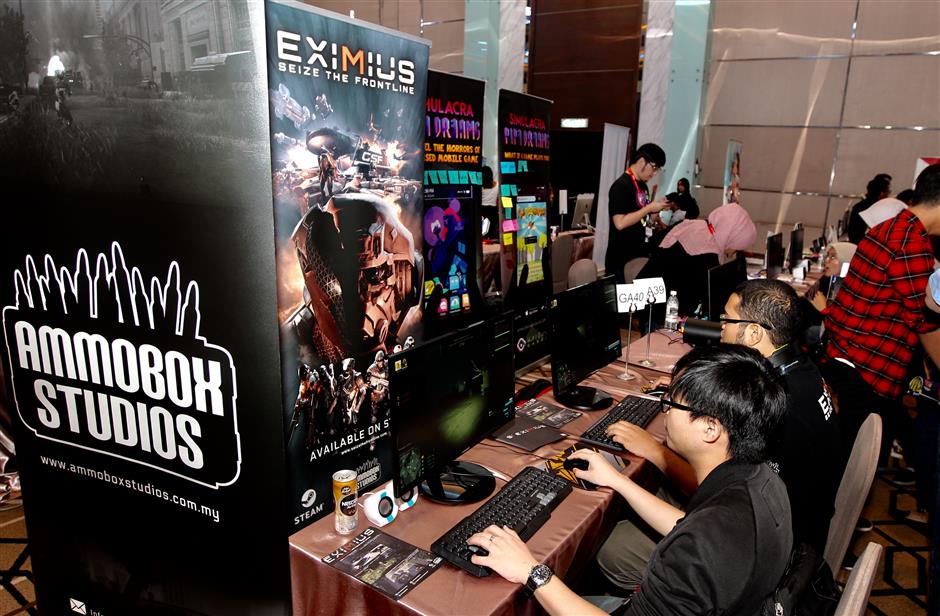/ Ammobox : How Malaysia Can Take Game Dev Further!
Ammobox : How Malaysia Can Take Game Dev Further!

About Jeremy Choo From Ammobox Studios
Jeremy Choo is not only the founder and CEO of Ammobox, he is one of Malaysia’s top game developers and a former lecturer on game development.
Established in 2008, Ammobox Studios is an independent game development studio based in Malaysia. Ammobox is responsible for developing the genre-breaking FPS/RTS hybrid game called EXIMIUS: Seize the Frontline.
With years of experience both in developing games, and cultivating new game developers, Jeremy Choo certainly knows what it would take for Malaysia to become a world-class nexus for game development.
In the following article, Jeremy will tell us how Malaysia’s game development has levelled up, and how we can take it further!
Ammobox: How Malaysia Can Take Game Dev Further!
We’ve all been there — the game nights with friends where we gather around the TV, wrestle over a game, and inevitably choose the evergreen classics that everyone used to play. The starter Pokemon of our gaming experiences, you could say.
There is something inherently nostalgic about the early days of gaming, back when things were very much simpler. Graphics quality, gameplay experience, even options for customisation; very few of us could even imagine we would’ve made such leaps and bounds in the couple of decades since the founding days of pixelated console gaming.
In conversations about the growth of the gaming industry at large, it’s all too easy for us to slip into discussions about the software, the devices, the technology that makes it at all possible for people to now even carry immersive, imaginary worlds in their pockets. But I’ve always believed that while technology will always be the medium that brings games to the masses, tech doesn’t power itself.
The indispensable beating heart of the gaming industry is the right talent to understand, complement, and drive the rapidly advancing technology that exists.
This is arguably one of the main reasons why the Malaysian game development scene was slow to boot up — and not for any scarcity of talent, but rather a lack of general support and understanding for working in gaming as professionals.
When I first founded Ammobox, the core challenge I faced wasn’t navigating the tech requirements, but rather hiring the right artists, engineers, and programmers to make use of that very technology. The homegrown gaming scene at the time was largely comprised of outsourced stragglers and all-purpose studios that did not necessarily specialise in games. This made developing local IPs (shorthand for intellectual property, or the entire premise and ownership rights to a game’s content) especially challenging.
Funding was a whole other nemesis in itself. Most fledgling game developers wound up having to bootstrap their projects, which meant working on a project long-term with expected delays and keeping afloat on the bare minimum of time, resources, and abilities. It wasn’t uncommon for full working versions of games to be released an entire decade after its IP was developed!
Perception fed into this problem, and the difficulty in creating Malaysian IPs has led to a vicious cycle that dogs the industry to this day. By ‘perception’, I don’t necessarily mean the snide “so you play video games for work?” comments — it’s also the impression that because Malaysia didn’t have as many IPs to its name as some of our neighbouring countries, investors were hesitant to fund an industry that might not turn out to be lucrative.
Today, the gaming market is projected to reach US$200 billion in value by 2028, and Malaysia is in a great position to benefit from this rich landscape of possibilities if we can rise to the occasion.
Gaming studios and developers are now more commonplace here. Larger talent pools have also mushroomed across the country as more young Malaysians turn to making their hobby their professional craft, and especially as local universities have begun opening up game development courses.
Our current challenge has thus evolved: it has gone beyond identifying and developing that talent, to now ensuring that we keep that talent here at home.
To do that, stakeholders both from within the gaming industry and outside in its many interconnected fields need to join forces, to help Malaysia’s game development scene catch up to where it really should and can be. Digital infrastructure like Internet speeds and geographical connectivity need to reach the heights of our regional peers (making for lower ping in games and an overall smoother experience for consumers).
As for funding campaigns, which have been made easier due to the work of organisations like the Malaysia Digital Economy Corporation (MDEC), investments are more likely to be made if the industry itself demonstrates that it is equipped for and capable of success. It is inherently a cycle: we have to first grow the industry and our IPs in order to grow our talents. We need to become those greener pastures that game development talents are seeking.
More employment opportunities, more participation in a globally competitive industry, more potential international investments and projects, more ways to showcase Malaysian talent to the world — the potential economic and cultural benefits that come from a thriving gaming industry are thrilling to imagine.
I genuinely believe that Malaysia, the diverse underdogs that we are, has a unique opportunity to take the global gaming industry by surprise with the local twist in our game titles and IPs. We already have the talent and the know-how! All we need is that little buff — so that we can graduate from mid-game to play in the big leagues.







